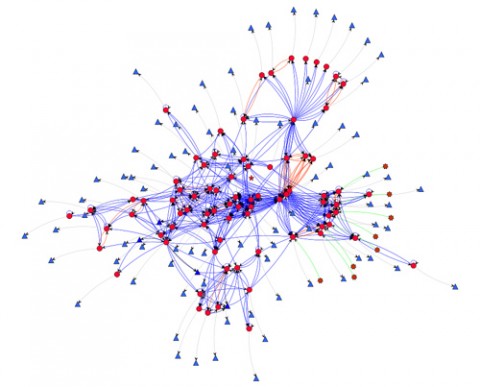The Network Story of Change
July 3, 2013 2 Comments
A couple of weeks ago there was an intriguing article in Next City entitled “The Post-Hero Economy: Learning to Lead Through Networks.” In it, Jennifer Bradley and Bruce Katz tell the story of some extraordinary attempts to boost a region in the midwestern United States. The focus is not on a leader or leaders, but on a network. As the authors state, “When telling stories of transformation and turnaround, it is tempting to shape them into personal stories about heroes. One charismatic visionary — a mayor, school superintendent, entrepreneur, outraged citizen — steps up and, with unrelenting vigor and inspirational leadership, starts an irreversible cascade of change. But there is a growing body of research suggesting that, as a system or problem becomes more complex, arriving at a solution requires multiple minds from multiple sectors or perspectives.” The article goes on to give a detailed account of the collaborative and innovative economic development efforts underway in Northeast Ohio. This is very much a story in progress, and the lessons highlighted so far resonate and are worth mentioning here for others engaged in or contemplating network approaches to social change:
- To be effective, “networks must cut across class, social and political boundaries.” Looser networks that go beyond the “old boys” and the usual suspects build resilience and adaptation in a system by encouraging new alliances and exchanges (see the contrasting stories of Youngstown, OH and Allentown, PA).
- The strongest networks bring together a multiplicity of weak ties rather than the repetition of strong ones (another way of stating the above).
- A network benefits from spending time early on building its own collaborative culture. With this groundwork in place, “the nascent network is better prepared to go out into the world and develop a shared set of goals and priorities.”
- “Even people who are willing to work together have to learn how to do it effectively.”
- An early sign of network success is when people think as larger body, not simply as or about an organization, for example, but a community or region.
- “For every node [of the network], the first priority has to be their own node.” This is why it is important to have some entity whose mission it is to strengthen the network and protect its collaborative culture.
- “In strong networks, participation is relevant and rewarding.”
I am very struck by and appreciative of the attempts to tell this story in a more holistic way that avoids oversimplifying what it takes to facilitate development in a system of this scale and complexity. Something about us may want to hear there is a hero in the wings or a silver bullet that will solve our challenges. But that just is not the case. That heroic hope actually invites us to dodge doing what we can to find our place and means to add value to the larger system. As Chris Thompson, of the Fund for Our Economic Future in Ohio, states, “We live in an era where power is diffuse and value is created through networks built on trust, not hierarchy. We’re going to have to learn how to manage in a networked world.”
2 Comments
Curtis, each of these bullet points about networks resonates with me. What I have a more challenging time with is with the effort to tell a story without simplifying it.
I absolutely agree that any significant change will come through the power of leaderful decentralized networks without an easily identifiable single leader.
What I have a hard time with is with the effort to move away from the possibly primal tendency to understand transformation as part of the hero’s journey.
What we find in networks is the “ontological equality” between nodes and links. Our connections are as real as the individuals connecting.
But each of these connection is among singularities, and each singularity arrives at this connection through its own “hero’s journey.” There is a potentially primal importance in continuing to tell the story of the hero. What has to change is what this hero does.
Here, hero is weaver, hero is amplifier, hero is influencer, hero is inspiration, attraction, authenticity, connection, the manifested power to create, wielded boldly and in the face of very real obstacles. Hero is risking everything, and the choice to risk is definitely individual, and a collection of individual choices.
I appreciated this point “A network benefits from spending time early on building its own collaborative culture.” In this article I just read http://www.forbes.com/sites/ashoka/2013/06/26/advice-to-changemakers-lessons-from-the-ashoka-american-express-emerging-innovators-boot-camp-in-toronto/
about lessons learned by social entrepreneurs, one said how important building a culture of a new organization is – essentially after 3 years it is fixed and much harder to change. It was a reminder that for me that in helping new networks form, we are essentially creating an organization of sorts (at a larger scale) that has a culture. How can we be intentional about creating a culture that encourages behaviors and ways of working the enable networks to thrive?